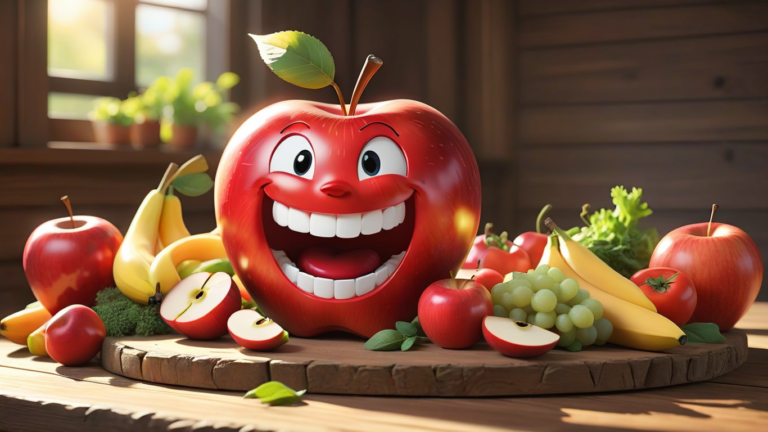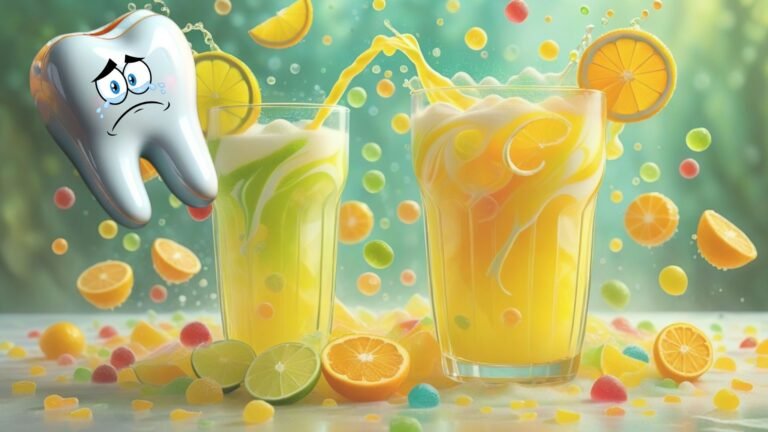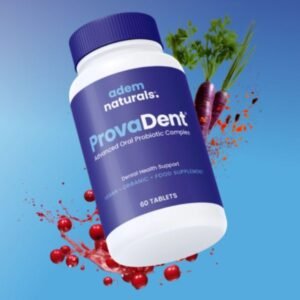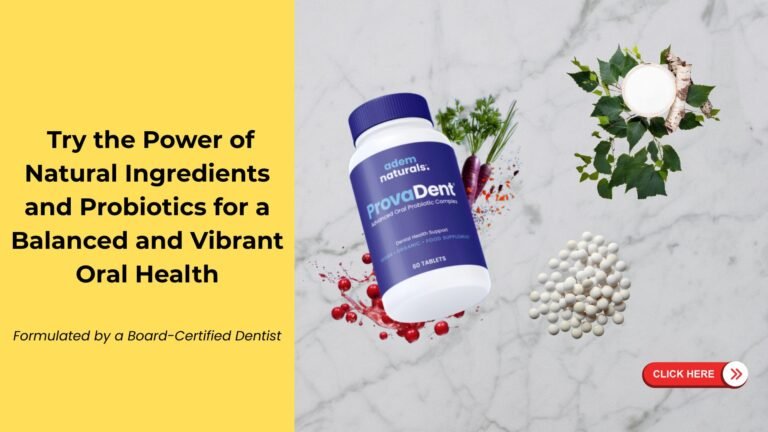Have you ever bitten into an apple and felt pain? Or skipped smiling in photos because of your teeth? The secret to a healthy smile might be in your kitchen, not just at the dentist.
Instead of just fluoride and dental visits, food can protect and even fix your teeth. This article will reveal which foods strengthen enamel, boost saliva, and fight tooth decay. You’ll also learn which foods might harm your teeth without you knowing.
Would you like to learn how to heal your teeth naturally? You’re in the right spot. Get ready for easy tips that will change how you view your teeth and diet!
Table of Contents
ToggleThe Surprising Link Between Food and Healthy Teeth
Many people think brushing and flossing are the only ways to keep teeth healthy. But what you eat also matters a lot. The right foods can strengthen your teeth, while the wrong ones can weaken them.
The acid levels in your mouth change with your diet. This affects your dental health. Learning to balance this is key to naturally healing your teeth.

The Tooth-Healing Superstars in Your Pantry
Cheese: A Cavity Crusher?
Did you know cheese can protect your teeth? Research has shown that eating cheese after meals, like breakfast, can lower cavity risk in kids. It’s full of calcium and phosphates that strengthen enamel and fight acids.
So, after a meal, try a slice of cheese. It’s a tasty way to support your teeth and gums.
The Power of Tooth-Protective Foods
Not all foods harm your teeth. Some clean them and keep your mouth’s pH balanced. These include:
- Avocados – They’re low in acidity and fight off harmful bacteria.
- Celery – It’s like a natural toothbrush, removing food and plaque while boosting saliva.
- Fresh Apples – Their fiber cleans teeth and gums, making them great for oral health.
Eating fibrous foods keeps teeth clean and boosts saliva, which fights acids and decay. Adding these to your diet can strengthen your teeth and gums.
Berries and Xylitol: A Sweet Surprise
Strawberries and raspberries are not just tasty; they’re good for your teeth. They contain Xylitol, a natural sugar that fights cavity-causing bacteria.
Dipping these berries in Xylitol makes them sweeter and more protective for your teeth. Enjoying them regularly can keep your smile bright and healthy.
Whole Milk and Water: Hydration and Healing
When it comes to foods for healthy teeth and gums, both whole milk and water play key roles:
- Whole Milk – It’s full of calcium, phosphorus, and vitamin D. These help strengthen tooth enamel and prevent decay. The proteins in milk also protect teeth from acid attacks.
- Water – Drinking water helps wash away food particles and reduce acidity. It keeps your mouth clean and hydrated.
Staying hydrated is key for good oral health. Water prevents dry mouth and supports saliva production. Saliva is vital for remineralizing teeth and keeping the mouth’s pH balanced.
Xylitol: The Saliva Stimulator
Xylitol does more than fight harmful bacteria—it also boosts saliva flow. This is important for healing gums and remineralizing teeth. Saliva is our body’s natural defense against cavities, washing away debris and neutralizing acids.
Eating Xylitol mints or gum can make your mouth produce more saliva. This creates a healthier environment for your teeth and gums. Aim for 1-2 grams of Xylitol daily to support saliva production and enhance your oral health naturally.
Nitric Oxide and Saliva: A Powerful Duo
Nitric oxide is essential for a healthy mouth. It plays a key role in blood circulation and saliva production. Certain foods boost nitric oxide levels, improving saliva flow and oral health. These include:
- Leafy Greens – Spinach, lettuce, and kale support nitric oxide production. This enhances saliva and gum health.
- Beets – Rich in nitrates, beets stimulate saliva and maintain an alkaline mouth environment.
- Onions and Garlic – While they may not be the best for fresh breath, they promote beneficial bacteria and saliva production. This keeps your teeth and gums strong.
Adding these nitric oxide-boosting foods to your meals can naturally support your body’s healing and protection of your teeth. A balanced diet and good oral hygiene can help keep your teeth and gums healthy for life.
Saliva and Oral Health
Why Saliva is Important for Your Teeth and Gums
Saliva is more than just spit—it’s a powerful natural defense for your mouth. It’s full of minerals like calcium and phosphate, which strengthen tooth enamel and repair minor damage. Saliva also contains enzymes and proteins that fight off harmful bacteria, reducing the risk of cavities and gum disease.
How Saliva Supports Oral Health
A healthy flow of saliva helps:
- Wash away food particles that can lead to plaque buildup.
- Neutralize acids from foods and drinks that weaken enamel.
- Replenish essential minerals to keep teeth strong.
- Prevent dry mouth, which can cause bad breath and increase the risk of decay.
Boosting Saliva with Foods for Healthy Teeth and Gums
Eating the right foods can naturally boost saliva production, keeping your mouth in top shape. Some of the best foods for healthy teeth and gums that promote saliva flow include:
- Leafy Greens – Spinach, kale, and lettuce help stimulate saliva and provide essential nutrients.
- Crunchy Vegetables – Celery, carrots, and cucumbers encourage chewing, which increases saliva flow.
- Citrus Fruits – Oranges and lemons contain natural acids that trigger saliva production.
- Xylitol-rich Foods – Berries, chewing gum, and Xylitol mints help keep saliva flowing and protect against cavities.
The Secret to Healthy Teeth: Saliva and Smart Eating
If you want to heal your teeth naturally, focus on saliva. Drink lots of water and avoid sugary snacks. Eat foods that make saliva, like fruits and veggies.
A hydrated mouth with plenty of saliva protects your teeth and gums. It keeps them healthy every day!
The Gut-Mouth Connection
How Your Digestive Health Affects Your Teeth and Gums
Gut health and oral health are closely linked. A healthy gut helps your body absorb minerals like calcium and magnesium. These minerals are key for strong teeth and gums.
If your body can’t absorb these minerals, your saliva won’t protect your teeth. This makes your teeth more likely to decay and feel sensitive.
The Two-Way Relationship Between Gut and Oral Health
A healthy gut helps your mouth, and vice versa. Bad oral health can harm your digestion. Harmful mouth bacteria can travel to your gut and upset its balance.
This can cause inflammation, bloating, and poor nutrient absorption. It weakens your body’s ability to support healthy teeth and gums.
Foods for Healthy Teeth and Gums That Support the Gut
Eating the right foods can boost both gut and oral health. This ensures better nutrient absorption and a balanced gut microbiome. Some top foods include:
- Fermented Foods – Yogurt, kefir, kimchi, and sauerkraut have probiotics. These support good gut bacteria and oral health.
- Fiber-Rich Foods – Whole grains, apples, and carrots feed beneficial gut bacteria. They also stimulate saliva production.
- Butyrate-Producing Foods – Butter, ghee, and resistant starches (like green bananas and cooked-then-cooled potatoes) maintain a strong gut lining. This improves mineral absorption for better teeth.
- Food Pairing for Better Absorption – Eating bananas with dairy enhances calcium uptake. This supports stronger teeth.
- Pomegranate for Gut Health – Pomegranate has compounds that promote healthy gut bacteria. This indirectly benefits oral health by reducing harmful microbes.
A Holistic Approach to Oral and Digestive Health
To heal your teeth naturally, focus on both your mouth and gut. Eat a diet rich in foods for healthy teeth and gums. This, along with good digestive health, helps your body absorb nutrients for a strong smile.
Prioritizing gut-friendly foods improves digestion and oral health. It’s a win-win for your body!

Foods That Damage Your Teeth
How Certain Foods Harm Your Teeth and Gums
Some foods harm your teeth, while others protect them. Sugary snacks, acidic drinks, and frequent nibbling weaken enamel and cause cavities. The more often you expose your teeth to these foods, the less time saliva has to repair them.
The Risks of Regular Snacking and Sugary Drinks
Every time you eat, bacteria in your mouth feed on food particles and produce acids. Constant snacking or drinking sugary drinks keeps your mouth acidic. This damages enamel and makes teeth more prone to decay.
Even healthy foods like dried fruits or flavored yogurts can have hidden sugars. These harm your teeth and gums.
Acidic Foods and Their Impact
Acidic foods and drinks, such as citrus fruits, soda, and vinegar-based dressings, can erode enamel over time. While these foods have nutritional benefits, consuming them in excess without rinsing your mouth afterward can cause damage. Instead, try pairing acidic foods with tooth-friendly options like cheese or nuts to reduce their impact.
The Best Ways to Avoid Tooth Damage
- Limit sugary snacks and drinks to avoid prolonged acid exposure.
- Drink water after eating to rinse away food particles and neutralize acidity.
- Choose foods for healthy teeth and gums, such as crunchy vegetables and dairy, to protect your enamel.
- Allow time between meals so saliva can do its job of repairing and remineralizing teeth.

5 Tips for a Radiant, Healthy Smile
Tip #1. End Meals with Tooth-Protective Foods
Finishing meals with foods like cheese, apples, or celery is a great way to protect your teeth. These foods help neutralize acids and clean your teeth naturally. They also stimulate saliva production, which is key for strong enamel.
Tip #2. Rinse Your Mouth After Eating
Rinse your mouth with water or use a sugar-free mouthwash after meals. This helps prevent plaque buildup and reduces cavity risk. Avoid brushing immediately after eating acidic foods to protect your enamel—wait about 30 minutes instead.
Tip #3. Allow Saliva to Work Its Magic
Saliva is important for protecting and strengthening your teeth. It contains minerals that help repair enamel and balance pH levels. Try avoiding food and drinks for at least an hour after eating to let saliva work its magic.
Tip #4. Incorporate Fiber-Rich Foods
Foods high in fiber, like leafy greens, carrots, and nuts, act as natural toothbrushes. They help scrub your teeth and promote a healthier gut. These foods also support gut health and help the body absorb essential minerals for stronger teeth and gums.
Tip #5. Use Xylitol Mints or Gums
Xylitol prevents harmful bacteria from thriving and encourages saliva production. Carrying Xylitol mints or gums and having one after meals can be a simple way to support foods for healthy teeth and gums while keeping your breath fresh.
Final Thought: A Lifetime of Healthy Smiles
Taking care of your teeth is more than just brushing and flossing—it starts with the right foods. By choosing tooth-friendly foods, boosting saliva production, and following smart oral habits, you can keep your smile strong and bright for a lifetime. Eating foods like cheese, apples, celery, and Xylitol helps prevent cavities and gum disease. When you understand how your diet impacts your oral health, you gain the power to heal and protect your teeth naturally. A little effort each day can lead to a healthier, more confident smile for years to come!

